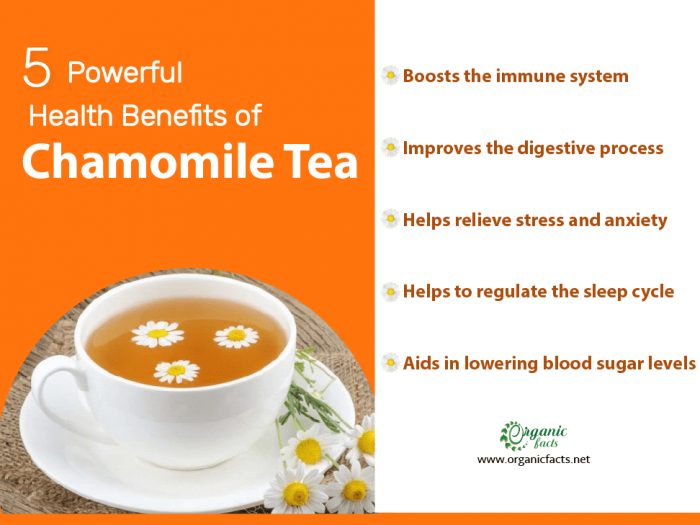Chamomile tea, a tranquil brew derived from the Asteraceae plant family, has been a cherished remedy across ages. Known for its gentle floral essence and a myriad of health benefits, this calming infusion offers a serene reprieve from daily stresses. As we delve into modern-day wellness, chamomile tea emerges as a soothing companion, promising better sleep, eased digestion, and a gentle touch during menstrual discomfort. Let’s explore the comforting realm of chamomile tea and its potential to harmonize traditional remedies with contemporary wellness needs.
What is Chamomile Tea?
Derived from the Asteraceae family of plants, dried chamomile flowers are used for different natural remedies and healing poultices. Their most popular form is tea.
The Spanish name for this tea is manzanilla tea. These plants come in many forms, so chamomile tea found in one part of the world may not be the same as somewhere else, but the fundamental components are quite similar and provide similar effects.
Studies have found that German chamomile flowers tend to have the strongest concentrations of beneficial compounds and nutrients that can be imparted to those who drink this popular tea regularly. [1]
Chamomile tea has a pleasant earthy and floral taste. It is well-known for its health benefits. The presence of flavonoids, sesquiterpenes, (often associated with antiseptic, antibacterial, or anti-inflammatory properties) and other powerful antioxidants in this tea have significant effects on the human body.
While it is commonly consumed as a beverage, chamomile extract is also used in capsules and aromatherapy oils. Chamomile lotion is topically applied in certain cases to get relief from various skin problems. Baby products such as soaps, shampoos, and wipes are popular due to their soothing nature. [2]
Serving Size : Nutrient Value Water [g] 99.7 Energy 1 Energy [kJ] 4 Ash [g] 0.01 Carbohydrate, by difference [g] 0.2 Calcium, Ca [mg] 2 Iron, Fe [mg] 0.08 Magnesium, Mg [mg] 1 Potassium, K [mg] 9 Sodium, Na [mg] 1 Zinc, Zn [mg] 0.04 Copper, Cu [mg] 0.02 Manganese, Mn [mg] 0.04 Thiamin [mg] 0.01 Riboflavin [mg] 0 Pantothenic acid [mg] 0.01 Folate, total [µg] 1 Folate, food [µg] 1 Folate, DFE [µg] 1 Vitamin A, RAE [µg] 1 Carotene, beta [µg] 12 Vitamin A, IU [IU] 20 Fatty acids, total saturated [g] 0 16:0 [g] 0 Fatty acids, total monounsaturated [g] 0 18:1 [g] 0 Fatty acids, total polyunsaturated [g] 0.01 18:2 [g] 0 18:3 [g] 0 Sources include : USDA [3]
Chamomile Tea Nutrition
According to the USDA National Nutrient Database for Standard Reference, chamomile tea contains negligible amounts of many vitamins and minerals potassium, magnesium, calcium, sodium, thiamin, riboflavin, and vitamin A. Other nutrients include folate, iron, and zinc. One cup (237 ml) of brewed chamomile tea provides 2 kcal of energy, 0.47 g of carbohydrates. [4]
To make the tea, read our Freshly Brewed Chamomile Tea Recipe.
Health Benefits
Let’s take a closer look at the benefits of drinking chamomile tea.
Enhancing Sleep Quality
Chamomile tea, a non-caffeinated herbal infusion, has been spotlighted for its potential to improve sleep quality. Particularly beneficial for individuals facing sleep apnea and restless sleep, a warm cup of chamomile tea before bed may be the ticket to a restful night, as suggested by research published in The Journal of Clinical Pharmacology. [5]
New mothers post-childbirth, might find chamomile tea especially helpful in enhancing their sleep quality. A study highlighted that postpartum women who enjoyed chamomile tea for a fortnight experienced better sleep quality. [6]
The sleep-promoting properties of chamomile are often attributed to its rich chemical profile, boasting over 120 identified elements including the antioxidant apigenin. Apigenin is known to bind to specific brain receptors, encouraging drowsiness and mitigating insomnia. [7]
Further, a separate study illustrated that individuals who consumed 270 mg of chamomile extract twice daily over 28 days experienced one-third fewer nighttime awakenings and drifted off to sleep 15 minutes quicker than the non-consumers. [8]
Hence, integrating chamomile tea into your nightly routine could be a step towards better sleep and, consequently, an improved state of mind.
You can learn more about the 7 Best Teas For A Good Night’s Sleep here.

A soothing cup of chamomile tea is great for putting yourself to sleep. Photo Credit: Shutterstock
May Reduce Inflammation
Chamomile tea could be a gentle remedy for stomach irritations, ranging from mild bloating to more severe irritable bowel syndrome (IBS) symptoms. Its potential antispasmodic and anti-inflammatory properties can be quite effective in soothing stomach and intestinal cramps. The tea harbors compounds known to mitigate inflammation. [9]
A 2009 study further elucidates that chamomile operates through a mechanism akin to non-steroidal anti-inflammatory drugs, offering a natural avenue to combat inflammation. [10]
So, the next time your stomach feels out of sorts, a warm cup of chamomile tea might just provide the soothing relief you need.
May Aid in Diabetes Management
Chamomile tea has shown promise in aiding diabetes management, as per research published in the Journal of Agricultural and Food Chemistry. [11]
It’s suggested that chamomile may enhance glycemic and lipid profiles, alongside reducing oxidative stress levels in individuals with diabetes mellitus, potentially lowering the risk of diabetes-related complications. [12]
A notable study involving 64 diabetic individuals revealed that those who drank chamomile tea daily with meals over eight weeks exhibited significantly lower average blood sugar levels compared to those who consumed water. [13]
Thus, incorporating chamomile tea into your meal routine could be a step towards better managing diabetes, alongside other prescribed treatments.
May Promote Heart Health
Research from Tufts University in Boston, MA, unveils that chamomile tea may play a part in heart health by aiding in lowering blood pressure and LDL (bad) cholesterol levels. [14]
Further studies also hint at its potential in reducing the occurrence of various cardiovascular issues. [15]
The heart-healthy attributes of chamomile tea are often credited to its richness in flavones, a class of antioxidants. Flavones have been scrutinized for their ability to lower blood pressure and cholesterol levels. [16]
Thus, sipping on chamomile tea could potentially be beneficial to your heart.
May Boost Immune System
The phenolic compounds that may be present in chamomile tea can help to strengthen your immune system and ward off infections. The other compounds present in chamomile tea may also fight cold, flu, and sinus issues, ultimately, relieving congestion. [17]
Read more about Decoding The Healthiest Tea here.
May Alleviate Stress & Anxiety
Manzanilla tea, commonly known as chamomile tea, is often sought for its potential to ease stress and anxiety. The warm, comforting nature of this brew may help elevate levels of serotonin and melatonin in the body, hormones known for mitigating stress and worry. [18]
A U.S. Journal suggests that the relaxing effect of chamomile tea could also provide relief from migraines and headaches, aiding in calming a restless mind and alleviating common anxiety symptoms. A daily regimen of one to two cups could significantly counter chronic stress. [19]
While more extensive studies are warranted, some research has found chamomile tea to be a promising aid in reducing moderate to severe generalized anxiety disorder (GAD) symptoms. Thus, incorporating chamomile tea into your daily routine could be a step towards fostering a calmer mind by reducing stress and anxiety. [20]

Did you know that the Spanish name for this tea is manzanilla tea?
May Enhance Skin Care
Chamomile tea, rich in anti-inflammatory and antioxidant properties, extends its benefits beyond a soothing beverage to a topical aid for skin care. Applying chamomile tea products can alleviate irritations and potentially address skin conditions like eczema. Its use can also promote healing, reducing the appearance of blemishes and wrinkles, thanks to its ability to combat oxidative stress and bolster the immune response. [21]
Research suggests that topical products infused with chamomile may aid in treating acne, soothing sensitive skin, and combating skin dehydration. [22]
A 2010 study demonstrated that the application of German chamomile oil on mouse skin effectively diminished allergy markers, hinting at its potential for alleviating skin allergies. [23]
Thus, chamomile tea could be a natural companion in your skincare routine, offering a gentle touch to your skin’s needs.
May Ward Off Osteoporosis
Chamomile extract has been under the lens for its potential role in combating bone loss, a concern that amplifies with age. A 2010 study delved into chamomile’s ability to stimulate the differentiation and mineralization of osteoblastic cells, showcasing its potential in promoting bone health. The study hinted at an anti-estrogenic effect, suggesting an estrogen receptor-related mechanism, although more research is needed to validate its clinical use. [24]
Fast forward to 2022, a study illustrated chamomile’s effectiveness in preventing osteoporosis in rats undergoing steroid treatment. The antioxidant prowess of flavonoids in chamomile was credited for this protective effect, as they help in reducing oxidative stress, a known contributor to osteoporosis[2]. [25]
These findings hint at chamomile’s promise of being more than just a calming brew, possibly extending a protective shield against osteoporosis.
May Alleviate Menstrual Discomfort
Chamomile tea, with its anti-inflammatory attributes, emerges as a comforting choice for women navigating through menstrual symptoms like bloating, cramping, anxiety, sweating, sleep disturbances, and mood swings. [26]
A 2019 research study further accentuates chamomile’s potential in alleviating menstrual discomfort, attributing its relief properties to the anti-inflammatory, antispasmodic, sedative, and anti-anxiety characteristics of chamomile. This suggests that chamomile tea might be a gentle companion in easing the anxiety and discomfort often accompanying premenstrual syndrome (PMS). [27]
Final Thoughts
Chamomile tea, with its potential health benefits, presents a simple and accessible choice for those seeking natural wellness options. Scientific studies have begun to explore its effects on sleep quality, stress reduction, and skincare However, it’s crucial to note that while promising, chamomile tea is not a replacement for medical treatment. It’s advisable to consult healthcare professionals before incorporating it into your routine, especially if you have existing health conditions or are on medication. As research continues to unfold, chamomile tea remains a comforting, traditional brew, potentially offering more than just a soothing experience.
Word of Caution: Caution is advised to pregnant and breastfeeding women as excessive consumption of this tea may result in a miscarriage. According to the National Institute of Health (NIH), it can cause allergic reactions and can also lead to drowsiness, eye irritation, vomiting, and nausea. So, always drink this tea in moderation. You can learn more about the Top 4 Chamomile Tea Side Effects here. [28] [29]
